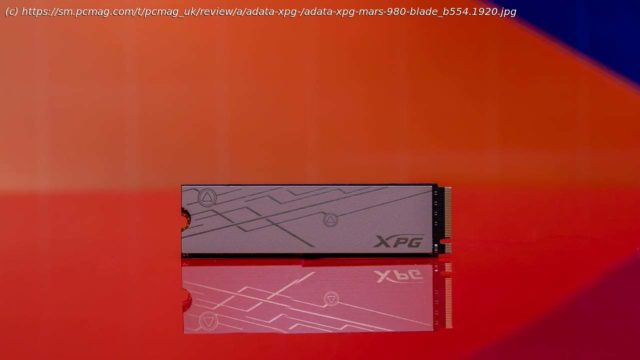The ADATA XPG Mars 980 Blade’s budget-friendly price doesn’t quite make up for this PCI Express 5.0 internal SSD’s uneven performance.
The ADATA XPG Mars 980 Blade (starts at $129.99 list for 1TB; $199.99 for 2TB as tested) is the company’s second PCI Express 5.0 internal solid-state drive (SSD). (The first was the ADATA Legend 970.) The Mars 980 provides a massive sequential read/write speed boost over its predecessor and some slight gains in random read/write performance, while coming in at a modest price for a PCIe 5.0 stick. But overall performance is lackluster, making the Editors’ Choice-winning Crucial T500 (our top value-and-performance pick for internal SSDs) a better choice if you’re okay with PCIe 4.0 speeds, and the WD Black SN8100 if PCIe 5.0 speed is your aim. Design: Heat Spreader Included
The Mars 980 Blade is a four-lane solid-state drive running the NVMe 2.0 protocol over a PCIe 5.0 bus. This internal SSD comes in the standard M.2 Type-2280 «gumstick» format. The two-sided drive (with chips on both sides) uses Micron’s B58R 232-layer 3D TLC NAND flash and a Silicon Motion SM2508 controller, which is designed for both high performance and energy efficiency.
The SM2508 is a relatively new controller, also used in the Crucial T710 and Lexar NM1090 Pro. The SM2508 has its own cache of dynamic random access memory (DRAM), unlike the controllers for so-called DRAM-less SSDs, which eschew their own memory cache and instead rely on their computer’s host memory buffer (HMB).
(Puzzled by some of these terms? Check out our handy guide to SSD terminology.)
The Mars 980 Blade comes with a thin aluminum heat spreader that can be stuck on the side with the exposed chips (the controller and NAND flash). The spreader’s compactness allows the SSD to easily fit in the secondary M.2 slot of a Sony PlayStation 5. Just keep in mind that the PS5 supports PCI Express 4.0, so when used in this manner, the Blade will revert to PCIe 4.0 speeds, which max out at about 5,000MBps.
The Mars 980 Blade is available in 1TB, 2TB, and 4TB capacities. Here’s a breakdown of the currently available capacities and their cost per gigabyte based on list prices:
These prices place it among the most affordable PCI Express 5.0 SSDs, and as with many drives, the Blade’s street price is typically lower than its list price.
As for durability, expressed as the lifetime write capacity in total terabytes written (TBW), the Mars 980 Blade’s ratings are a notch above the Corsair MP700 Pro, the ADATA Legend 970, and the Gigabyte Aorus 10000 Gen 5, which are rated at 700TBW for 1TB and 1,400TBW for 2TB, in the capacities they share. The Blade’s durability also exceeds that of the Crucial T700, T705, and T710, which are all rated at 600TBW, 1,200TBW, and 2,400TBW for their 1TB, 2TB, and 4TB models, respectively.






